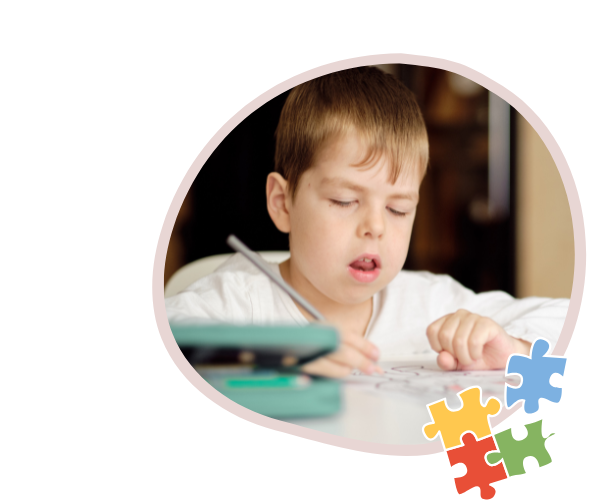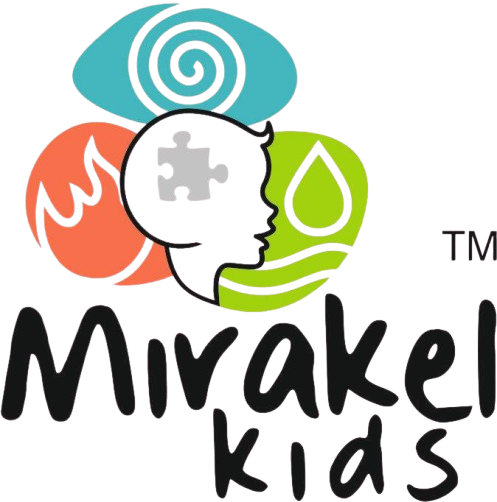Non-Learning Disabilities

What are Non-Learning Disabilities?
Non-learning disabilities are a group of conditions that impact a child’s behaviour, emotional regulation, and overall functioning without affecting their cognitive or intellectual abilities. These conditions can significantly influence a child’s social interactions, daily routines, and overall well-being. Unlike learning disabilities, which directly affect academic performance, non-learning disabilities affect emotional health, behaviour, and overall mental development. While these can be managed with therapy, Ayurveda offers a natural approach to enhance emotional stability, promote healthy social interactions, and reduce impulsive behaviours, allowing children to live fulfilling and balanced lives.
Ayurvedic Perspective on Non-Learning Disabilities
In Ayurveda, non-learning disabilities are often linked to an imbalance in the Vata dosha, which governs movement, mental processes, and the nervous system. An aggravated Vata can lead to emotional dysregulation, impulsivity, and difficulty with behaviour management. Ayurvedic treatments focus on calming the nervous system, balancing the doshas, and improving emotional regulation, creating a harmonious environment for the child to thrive in.
Causes of Non-Learning Disabilities:
The causes of non-learning disabilities can be influenced by various factors, including both genetic and environmental components:
-
1
Genetic Predisposition:
A family history of emotional or behavioural conditions can increase the likelihood of non-learning disabilities.
-
2
Traumatic Experiences:
Emotional trauma or stress during early childhood, such as neglect, abuse, or severe life changes, can contribute to behavioural disorders.
-
3
Nutritional Deficiencies:
Lack of essential nutrients like Omega-3 fatty acids, magnesium, and zinc can impair brain function and emotional regulation.
-
4
Prenatal Factors:
Exposure to toxins, alcohol, or drugs during pregnancy may increase the risk of emotional and behavioural conditions.
-
5
Environmental Stressors:
Excessive screen time, lack of physical activity, and stressful home or school environments can exacerbate non-learning disabilities.
-
6
Brain Injuries or Illness:
Physical injury to the brain or chronic illness affecting the nervous system can lead to issues with emotional regulation and behaviour.
Non-Learning Disabilities Support Program at Mirakel Kids™
At Mirakel Kids™, we offer a holistic approach to managing non-learning disabilities. By combining Ayurvedic therapies with modern methods, we address the root causes and provide comprehensive support to enhance emotional regulation, improve behaviour, and promote healthy social interactions. Through Mạnӧ Saṃvardhāna Chikitsā™, a specialised 4-pillar Ayurvedic protocol, we help children manage the challenges associated with non-learning disabilities and improve overall well-being.
Book An Appointment
Know More About
- Condition We Treat
- Therapies
Non-Learning Disabilities Treatment with Mạnӧ Saṃvardhāna Chikitsā™
Holistic Ayurvedic Support for Neurodevelopmental Challenges with Mạnӧ Saṃvardhāna Chikitsā™
At Mirakel Kids™, we follow Mạnӧ Saṃvardhāna Chikitsā™, a specialised Ayurvedic therapy designed to support children with Non-Learning Disabilities (NLDs), including intellectual disabilities, developmental delays, motor coordination issues, and executive functioning difficulties. Rooted in Ayurvedic wisdom, this approach nourishes, strengthens, and balances the mind and nervous system, helping children enhance cognition, emotional regulation, social interaction, and adaptive skills.
Mạnӧ (मनः)
Mind, psychological well-being, cognitive functions
Saṃvardhāna (संवर्धन)
Nourishment, development, enhancement
Chikitsā (चिकित्सा)
Treatment, therapy
Thus, Mạnӧ Saṃvardhāna Chikitsā™ translates to “Holistic Mind Nourishing Therapy.” It is an Ayurvedic approach designed to enhance brain function, regulate motor and sensory processing, and improve behavioural & adaptive responses in children with global developmental delays, executive dysfunction, motor coordination disorders, and social-communication challenges.
Mạnӧ Saṃvardhāna Chikitsā™ is based on a structured 4-pillar protocol consisting of Bahya Chikitsa (External Therapy), Abhyantar Chikitsa (Internal Therapy), DEALS Framework, and Parental Support & Holistic Development to promote overall well-being.
Bahya Chikitsa (External Therapy)
Targeted Ayurvedic Therapies for Neurological Development & Motor Coordination
Bahya Chikitsa consists of specialised Ayurvedic therapies that stimulate neurological function, motor skills, sensory integration, and brain plasticity, helping children with adaptive and executive function challenges.
Therapies Under Bahya Chikitsa
-
1
Abhyanga (Ayurvedic Oil Massage) –
Uses medicated oils like Brahmi Taila, Ksheerabala Taila, and Ashwagandha Taila to improve neural connectivity, motor coordination, and emotional regulation.
-
2
Shirodhara (Medicated Oil Dripping Therapy) –
A steady stream of warm herbal oil on the forehead stimulates brain pathways, enhances cognition, and improves sensory processing.
-
3
Nasya (Medicated Nasal Therapy) –
Herbal oils like Anu Taila and Brahmi Ghrita are administered through the nasal passage to improve neurotransmitter activity, speech development, and emotional resilience.
-
4
Matra Vasti (Gentle Medicated Enema Therapy) –
A mild, child-friendly Vasti using Brahmi Taila & Ksheerabala Taila to detoxify the nervous system, balance Vata dosha, and support cognitive & adaptive function.
Benefits for Non-Learning Disabilities
- Enhances motor coordination & executive functioning
- Improves sensory integration & adaptive skills
- Strengthens cognitive processing & emotional regulation
- Supports speech development & social communication
Abhyantar Chikitsa (Internal Therapy)
Brain-Nourishing Herbal Formulations to Support Cognitive & Motor Development
Abhyantar Chikitsa focuses on internal Ayurvedic medicines and brain-strengthening herbs (Medhya Rasayanas) that enhance cognitive adaptability, motor control, and emotional regulation.
Key Herbs Used
-
1
Brahmi (Bacopa Monnieri) –
Enhances memory, focus, and neural connectivity.
-
2
Shankhapushpi –
Strengthens problem-solving skills, emotional regulation, and cognitive flexibility.
-
3
Vacha (Acorus calamus) –
Supports language development, speech clarity, and motor planning.
-
4
Ashwagandha –
Reduces anxiety, frustration, and sensory overload.
-
5
Guduchi & Mandukaparni –
Strengthen the nervous system, improve brain adaptability, and regulate sensory processing.
Benefits for Non-Learning Disabilities
- Enhances focus, memory & cognitive adaptability
- Improves motor planning, coordination & fine motor skills
- Strengthens emotional resilience & impulse control
- Supports language development & social interaction
Duration: 1-3 years (based on severity)
A Structured Holistic Approach to Cognitive & Motor Functioning
-
1
D – Diet Management –
An Ayurvedic diet rich in brain-boosting nutrients (ghee, saffron, nuts, and Medhya Rasayanas) to improve cognition, motor skills, and neural connectivity.
-
2
E – Exercise Management –
Yoga postures, balance training, and sensory-motor exercises to enhance gross & fine motor skills, executive functioning, and spatial awareness.
-
3
A – Art of Sensory Integration Management –
Children with Non-Learning Disabilities often experience motor planning difficulties, spatial awareness issues, and sensory regulation challenges.
-
4
L – Lifestyle Management –
Regulated sleep patterns, structured physical activities, and stress-reduction techniques to promote daily functional independence.
-
5
S – Stress & Sleep Management –
Ayurvedic therapies like Shirodhara and Nasya, combined with guided relaxation techniques, to improve sleep quality, emotional stability, and cognitive function.
How Sensory Integration Works for Non-Learning Disabilities:
-
1
Vestibular Sensory Sensitivity:
Difficulty in balancing, coordination, and body movement control. Ayurvedic therapies, balance exercises, and movement-based interventions help enhance motor stability & spatial perception.
-
2
Proprioceptive Processing Issues:
Struggles with body awareness, handwriting, and fine motor tasks. Herbal massage, targeted motor exercises, and Ayurvedic Rasayanas improve hand-eye coordination & adaptive function.
-
2
Tactile Sensitivity Challenges:
Hypersensitivity or under-responsiveness to touch, impacting daily activities like dressing, eating, and physical play. Ayurvedic touch therapies and desensitization techniques help normalize sensory responses.
Benefits for Non-Learning Disabilities
- Boosted Brain Health & Cognitive Support
- Enhanced Physical & Mental Resilience
- Improved Sensory Integration & Comfort
- Optimized Lifestyle & Emotional Stability
Duration: Ongoing (with periodic adjustments)
Empowering Families with Ayurvedic & Behavioural Strategies for Developmental Support
A nurturing family environment is essential for children with Non-Learning Disabilities to develop adaptive skills and independence. Our parental support program includes:
Key Strategies for Home-Based Support
-
1
Dinacharya (Daily Routine for Kids) –
Establishing a structured schedule, cognitive-boosting herbal tonics, and physical activity-based learning.
- 2 Yoga & Pranayama for Motor & Cognitive Development
- 3 Aromatherapy & Sound Therapy for Emotional Stability
- 4 Mantra Chanting for Focus & Communication
Benefits for Non-Learning Disabilities
- Supports parents in creating a structured, nurturing environment
- Enhances motor skills, coordination & cognitive abilities
- Improves social interaction, emotional resilience & adaptive skills
- Encourages independent functioning & confidence
Duration: Ongoing (with periodic adjustments)
Why Choose Mạnӧ Saṃvardhāna Chikitsā™ for Non-Learning Disabilities?
A Unique Ayurvedic Therapy Tailored for Developmental Challenges
100% Natural & Safe Treatments
Customised Ayurvedic Therapies – External & Internal Therapies, DEALS Framework, & Sensory Integration
Clinically Proven to Enhance Motor Skills, Cognitive Function & Daily Adaptability
FAQ
-
What are non-learning disabilities, and how can Ayurveda help?
Non-learning disabilities are emotional and behavioural conditions that affect social interactions and emotional regulation without affecting cognitive abilities. Ayurveda addresses these conditions by balancing the doshas, calming the nervous system, and enhancing emotional regulation and cognitive function.
-
Is the treatment for non-learning disabilities at Mirakel Kids™ safe for my child?
Yes, all treatments are safe, non-invasive, and natural. They are specifically designed to support your child’s emotional and behavioural well-being without side effects.
-
How long does it take to see results?
Many children show improvements in emotional regulation, behaviour, and social interactions within a few weeks of starting treatment. Long-term results may take 1-3 years depending on the severity of the condition.
-
Are these treatments painful?
No, all treatments are gentle and relaxing, designed to make your child feel comfortable and calm during the process.
-
How do I get started?
Contact Mirakel Kids™ to schedule an initial consultation. We will assess your child’s needs and create a personalised treatment plan tailored to their emotional and behavioural needs.
Disclaimer: Ayurvedic treatments mentioned in this content may support overall wellness and can act as complementary therapies. However, for conditions like speech delay, these treatments should be used in conjunction with conventional medical interventions, such as speech therapy and behavioral treatments, under the guidance of healthcare professionals.
